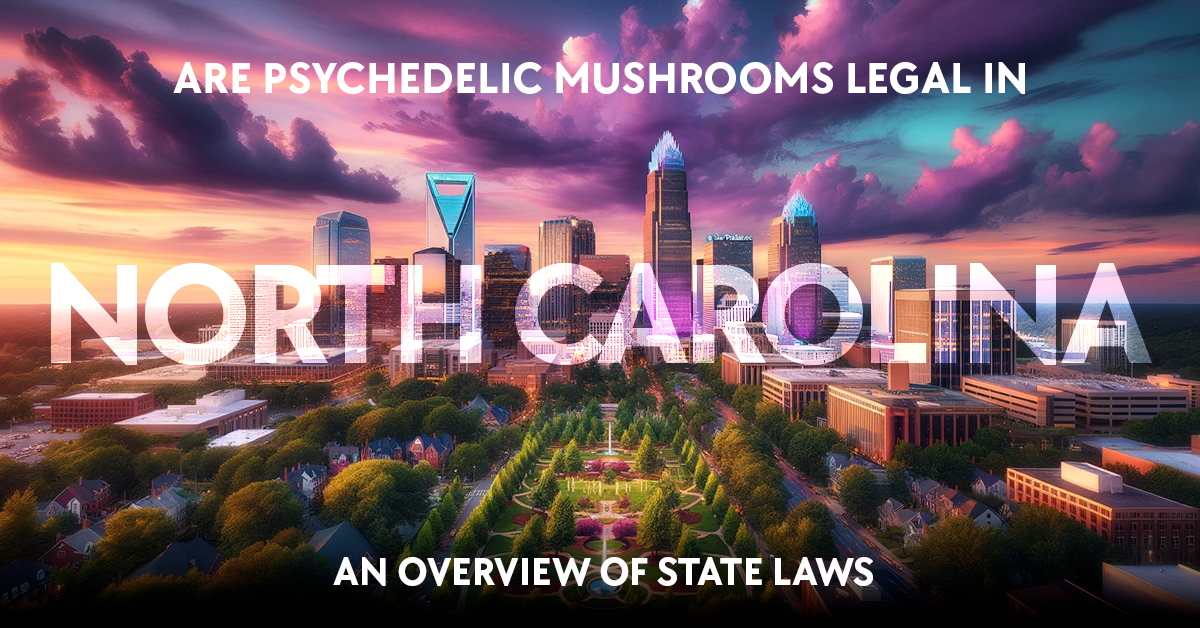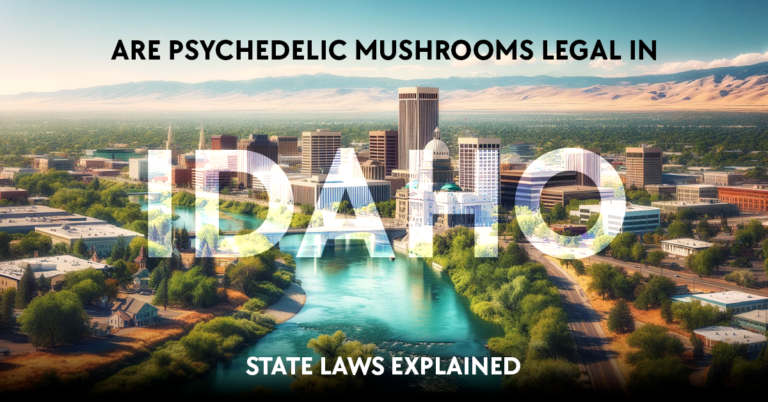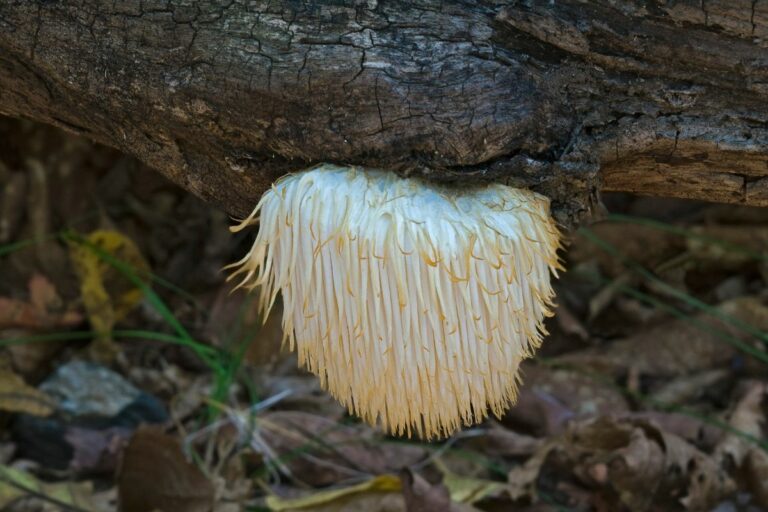If you’re curious about the legal status of psychedelic mushrooms in North Carolina, you’re not alone. Psilocybin, the active compound in what are often referred to as “magic mushrooms,” has been a subject of both scrutiny and fascination. Despite growing interest in the therapeutic potential of psilocybin for treating conditions such as depression and PTSD, the use, possession, or sale of psychedelic mushrooms remains illegal under North Carolina state law.

While some cities and states across the country have begun to de-prioritize the enforcement of laws pertaining to psilocybin mushrooms, in North Carolina, these substances are still classified as Schedule I controlled substances. This means that they are considered to have a high potential for abuse, no currently accepted medical use, and a lack of accepted safety for use under medical supervision. Therefore, any interaction with psilocybin mushrooms—whether it be for personal use, distribution, or cultivation—could result in legal repercussions.
Understanding the legal landscape is crucial before considering any engagement with psilocybin mushrooms in North Carolina. It’s important to recognize that while the conversation around psychedelic substances is evolving, the laws within your state have not changed, and penalties for violating these laws can be severe. Stay informed on the status of such substances to navigate the complexities of the law confidently and safely.
Legality of Psychedelic Mushrooms in North Carolina
Table of Contents
https://www.youtube.com/watch?v=XhRAG5ZMU9Q&embed=true
Understanding the legal status of psychedelic mushrooms in North Carolina is crucial for your awareness and compliance with state and federal laws. These substances, including psilocybin and psilocin, are highly regulated.
North Carolina State Laws Regarding Psychedelics
In North Carolina, psilocybin and psilocin, the active hallucinogenic compounds in what are commonly referred to as “magic mushrooms,” are illegal. They are listed under N.C. Gen. Stat. § 90-89(3)(r) as Schedule I controlled substances. This means that possession, sale, manufacturing, or cultivation of psychedelic mushrooms is prohibited by state law.
- Possession of these substances is considered a Class I felony, which can carry various penalties including fines and imprisonment.
- Sale or manufacturing could result in more severe charges, classified as a Class G felony, with correspondingly harsher penalties.
It’s essential for you to understand that any activity involving psychedelic mushrooms in North Carolina could lead to significant legal repercussions.
Federal Classification of Psychedelic Substances
On the federal level, psilocybin and psilocin are also classified as Schedule I controlled substances by the DEA. Federal law maintains that these substances have a high potential for abuse, no currently accepted medical use in treatment in the United States, and a lack of accepted safety for use under medical supervision.
- Under this classification, the legal status of any activity related to these compounds — be it use, possession, sale, or manufacturing — is illegal.
Adherence to these laws is mandatory, and violations can lead to prosecution under federal law, which may impose severe penalties. It is your responsibility to stay informed and abide by both state and federal regulations concerning psychedelic mushrooms.
Penalties for Possession and Distribution

In North Carolina, the possession and distribution of psychedelic mushrooms, which contain the psychoactive substance psilocybin, are illegal. These substances fall under Schedule I controlled substances due to their high potential for abuse and lack of recognized medical value.
Possession: If you are found in possession of psychedelic mushrooms, the consequences can be severe. Psilocybin mushrooms are typically charged as a Class I felony. The severity of the legal penalties you might face can be influenced by various factors including the amount in your possession and any prior convictions.
-
Less than 10 pounds: Considered a Class I felony, penalties may include a fine at the discretion of the court, and probation or imprisonment ranging from 3 to 12 months.
-
More than 10 pounds: The law escalates the charge to a higher class of felony, which can lead to significantly increased penalties.
Sale or Distribution: The penalties become even more serious if you are involved in the sale or distribution of psychedelic mushrooms.
-
Class H Felony: Sale of less than 10 pounds is generally charged as a Class H Felony, with penalties ranging from 4 to 25 months of incarceration.
-
Class G Felony: If the amount exceeds 10 pounds, the charge may be elevated to a Class G Felony, with penalties including incarceration for 8 to 31 months.
It is important for you to be aware that North Carolina takes these violations seriously, and any drug conviction can lead to a significant impact on your future, including potential employment, education, and housing opportunities. Always consult legal representation if you find yourself facing such charges.
Medical Research and Therapeutic Use

In North Carolina, your interest in the medical potential of psychedelic mushrooms ties into cutting-edge research and strict legal frameworks that govern their therapeutic use.
Current Research on Psychedelics
Current research on psychedelic substances, including psilocybin—the psychoactive component found in magic mushrooms—has been showing promise in treating a range of mental health conditions. For instance, studies suggest that psychedelic-assisted psychotherapy could be beneficial for treating depression, anxiety, PTSD, and addiction. Scientists at institutions like the University of North Carolina are actively examining the effects of psychedelics like psilocybin to provide insights and compare findings within the scientific community.
Psychedelic Therapy Legal Framework
Despite compelling research, the legal terrain for using psychedelics in therapy remains challenging. Psychedelic substances, including psilocybin mushrooms, generally fall under Schedule I drugs, making their use illegal outside of approved research settings. However, recent legislative efforts hint at potential changes, with the FDA recognizing the medicinal promise of these substances, granting breakthrough therapy designation to psychedelics for certain conditions. This indicates a possible shift towards a more permissive stance for medicinal use under strict regulations. For those in North Carolina, this means careful monitoring of both state and federal laws concerning the medicinal use of psychoactive substances in psychotherapy.
Reform Movements and Decriminalization Efforts

In the ever-evolving landscape of drug policies, certain U.S. cities and states have taken steps toward the decriminalization of psychedelic mushrooms. This shift reflects a recognition of the potential therapeutic benefits and a changing public sentiment toward these substances.
U.S. Cities and States with Changed Policies
- Oregon: Oregon stands as a pioneer, having decriminalized the possession of small amounts of psychedelic mushrooms and even created a program for legal medical use following Regulation Measure 109.
- California: Efforts are underway to push similar legislation.
- Colorado: Denver became the first city to decriminalize the possession and personal use of psychedelic mushrooms.
- Others: Oakland, Santa Cruz, and Ann Arbor have also passed resolutions to decriminalize psilocybin.
These actions at the municipal level showcase a shift in both legality and the cultural perception of psychedelic substances.
Advocacy for Therapeutic and Medical Use
Advocates are increasingly vocal about the therapeutic benefit of psilocybin, which has prompted some of these changes. The concept of medical use is central to the discourse, emphasizing psilocybin’s potential role in treating depression, PTSD, and addiction, as supported by research conducted in controlled environments.
- Medical Legalization: The move towards legalizing psilocybin for medical purposes is gaining traction, as emerging studies suggest significant therapeutic outcomes.
- Regulation: With decriminalization comes the necessity for a regulatory framework, ensuring safety and control over the use and distribution of psychedelic substances.
As legislation continues to evolve, you may witness further changes, potentially shaping a new landscape for psychedelics across the country. Keep an eye on regulatory updates and emerging research to stay informed of these developments.
Psychedelic Safety and Potential Risks
When considering the use of hallucinogenic mushrooms, it’s important to be aware of both their safety protocols and potential risks. These mushrooms contain a psychoactive compound called psilocybin, which can significantly alter your perception. Here’s what you need to know:
- Safe Use: Ensure you’re in a secure environment with trusted individuals who can assist if you experience a bad trip. Know your source to avoid misuse of potentially harmful substances.
- Risks: Psilocybin can cause adverse effects, including paranoia, hallucinations, and in rare cases, psychosis. Be mindful of your mental health history, as psychedelics can exacerbate certain conditions.
Short-Term Side Effects:
- Nausea
- Disorientation
- Mood swings
- Intensified sensory experiences
Mental Health Considerations:
- History of mental illness could elevate risk for negative experiences.
- Bad trips can provoke intense fear and anxiety, highlighting the need for a safe setting.
Be cautious and stay informed about the legal status in your area, as possession and use typically remain illegal in places like North Carolina. Your awareness and preparation are crucial for reducing risks associated with psychedelic mushrooms.
Global Perspective on Psychedelic Mushrooms
Psychedelic mushrooms have varied legal recognition around the world, with some countries having decriminalized or regulated their use, while others maintain strict prohibitions.
Comparative Legal Status Internationally
When you look at the legal status of psychedelic mushrooms internationally, there is a significant disparity. In some places, such as the Netherlands, certain types of “magic truffles” are legal and are sold in smart shops. However, in many other countries, including the United States, the United Kingdom, and Australia, psilocybin — the psychoactive compound in magic mushrooms — is classified as an illegal substance with severe penalties for possession, sale, or cultivation.
In recent years, there has been a shift towards a more lenient approach to psychedelics in some regions. For example, in Canada, researchers have been given the green light to study psychedelic drugs for therapeutic purposes. This is one of the first instances in over four decades that an illegal psychedelic drug has been clinically tested in Canada.
Psychedelics and Cultural Context
Your understanding of the cultural context surrounding psychedelic mushrooms is essential to grasp their complex global status. Indigenous traditions, such as those in Central America, have revered these psychoactive substances for centuries, regarding them as sacred tools for spiritual experiences. Today, this traditional use clashes with international drug policies that largely classify psychedelics as controlled substances.
Nevertheless, the cultural significance of these substances has contributed to the push for legalization or decriminalization in certain jurisdictions. For instance, parts of the United States have begun to challenge the status quo — cities like Denver, Colorado, and Oakland, California have decriminalized the use of psilocybin mushrooms, citing their potential benefits for mental health and spiritual growth.
The international perspective on psychedelic mushrooms demonstrates a complex tapestry of legal and cultural interpretations, reflecting a broad spectrum of attitudes towards these enigmatic substances.
Future of Psychedelic Policy in North Carolina
Your understanding of the psychedelic policy in North Carolina may be shaped by both current legal frameworks and ongoing advocacy. Psychedelics, including magic mushrooms containing psilocybin, are currently classified as Schedule I substances under both federal and state law. However, emerging research into their medicinal potential is influencing attitudes toward legalization.
Legislative action regarding the legal status of psychedelics in North Carolina has yet to unfold, but there are indicators of change. Advocates are pushing for reforms based on medicinal benefits, which could lead to a shift in regulation, potentially decriminalizing or legalizing these psychoactive substances for therapeutic use.
- Legislation: Future regulatory changes depend on new bills being presented and passed. Keep an eye on the North Carolina General Assembly for related legislative proposals.
- Medicinal Use: Growing evidence of therapeutic benefits may result in allowances for use in controlled medical settings.
- Recreational Use: Although less likely in the near term, changes in public perception and legal precedents elsewhere may open the door to debate on this front as well.
- Legalization Advocates: Non-profit organizations and individuals may play a pivotal role in propelling policy changes through education and lobbying efforts.
Progress in states like Oregon, which has legalized regulated therapeutic use, sets a potential precedent for change that could influence reform in North Carolina. However, any modification to the state’s approach will require careful regulation to balance public health, safety, and the interest in potential psychedelic treatments. As you observe this evolving landscape, staying informed on local and national policy discussions will be key to understanding possible outcomes.
Conclusion
In North Carolina, psychedelic mushrooms, which contain the active ingredient psilocybin, are classified as a Schedule I controlled substance. This means that their manufacturing, distribution, possession, and use are illegal for any purpose, including recreational and therapeutic uses. Despite ongoing research highlighting potential benefits in treating a variety of psychological conditions, these substances remain prohibited by law.
You should be aware that the legal landscape could evolve due to changes in public opinion and scientific understanding. Current legislative frameworks both nationally and in North Carolina do not differentiate between the use of psychedelic mushrooms for personal exploration and potential therapeutic use.
Looking forward, it’s crucial to monitor scientific outcomes and future prospects for legal reform. Even as the discussion around the potential medical benefits of psychedelic mushrooms continues to grow, any changes to their legal status will depend on legislative action guided by research findings and societal values.
Remember, even if public opinion shifts significantly in favor of decriminalization or legalization of psychedelic mushrooms, for now, the possession and use remain illegal in North Carolina. Always ensure to stay informed of the latest legal developments to navigate this evolving topic responsibly.
Frequently Asked Questions
In this section, you will find detailed answers about the legal aspects of psilocybin mushrooms in North Carolina.
What are the penalties for possession of psilocybin mushrooms in North Carolina?
Possession of psilocybin mushrooms is illegal in North Carolina, categorized as a Schedule I controlled substance. If caught, you may face criminal charges, including fines and imprisonment, proportionate to the quantity possessed.
Has there been recent legislation regarding the decriminalization of psychedelics in North Carolina?
No recent legislation has successfully decriminalized psychedelics in North Carolina. Psilocybin remains classified as a Schedule I substance and possession remains a serious offense under state law.
Can individuals use psychedelic mushrooms for medical purposes legally in North Carolina?
You cannot legally use psychedelic mushrooms for medical purposes in North Carolina. They are not approved by the state for any medicinal use and possession remains illegal.
What distinguishes the legality of psilocybin mushrooms from other controlled substances in North Carolina?
Psilocybin mushrooms are rigorously regulated because they are on Schedule I, the same as heroin and LSD, characterized by a high potential for abuse and no recognized medical use according to federal and state laws.
Are there any active campaigns or movements in North Carolina advocating for changes to psychedelic mushroom laws?
While advocacy groups might exist, no major legislative changes or mobilizations have gained significant traction in North Carolina for the reform of laws concerning psychedelic mushrooms.
Has there been any legal precedence affecting the status of psychedelic mushroom use or research in North Carolina?
As of now, there are no legal precedents or court decisions in North Carolina that have notably altered the legal status of psychedelic mushroom use or research.







